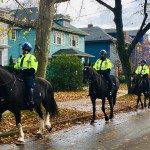There is much work to be done to address food insecurity within Canada (and globally). We must dismantle racism, heal the wounds of the colonial food system, and reconnect our food and our health. Food as a human right was first recognized in law in 1948 in the United Nations Declaration of Human Rights and again in 1967 in the International Covenant on Economic, Social, and Cultural Rights. However, there is no explicit recognition of the right to food in Canada, besides safety and labeling regulations. Canada has work to be done in addressing food in public policy as there is no excuse for over 4 million Canadians to be living in food insecurity. Many organizations across the country are actively engaged in addressing food insecurity.
I had the wonderful opportunity to engage with many of these organizations while attending Food Secure Canada’s 10th Assembly: Resetting the Table (http://2018.resettingthetable.ca/sites/foodsecurecanada/en/resettingthetable) in Montreal. As Canada’s most lively gathering of food activists, over 600 people attended from across the country to discuss all things food security. Lectures, panels, working groups, and workshops were on such topics as sustainability, food justice, Indigenous Food Sovereignty, and municipal food policies. These are just some of the many intersecting topics covered throughout the intense and thought-provoking four days.
Elder Kahnawake Otsitsaken;ra (Charles Patton) opened the proceedings, held on the unceded territory of the Kanien’keha:ha (Mohawk) nation at Concordia University. To begin our discussions, he grounded us in the wisdom of place and respect to the gifts of mother earth, particularly the three sisters: corn, beans, and squash, that have nurtured us for millennia.
The first day allowed for participants to visit food organizations throughout the Montreal area, including community food centers, greenhouses, farms, and social innovation hubs. I visited ‘Grand Potager’ (http://grandpotager.ca/) in Verdun, an inspiring organization bringing together the municipality, social enterprises, community organizations, and the public in an innovative approach to urban agriculture. Each member supports the others through group buying, common volunteers, and shared efforts in visibility. The model showcases how to cultivate fruit, vegetables, and even fish in the city!
I also participated in Concordia’s Sustainable Food System tour, where I was able to learn about the many student-led, sustainable food initiatives on campus. This included anti-capitalist grocery stores like ‘Le Frigo Vert’ (http://www.lefrigovert.com/), cooperative cafes like the ‘Hive Café Solidarity Cooperative’ (http://hivecafe.ca/), the student-led vegan soup kitchen, the ‘People’s Potato’ (https://www.peoplespotato.com/), and more! All of these demonstrating alternative and innovative ways to improve student access to healthy, affordable, and just food on campus.

Students line up for a tasty vegan meal at the People’s Potato.
With so many workshops and speakers to choose from, it was impossible to touch on all topics of the conference. I found myself mostly drawn to sessions on issues of food justice, racism in the food system, food as a human right, and Indigenous Food Sovereignty. I was able to reflect further on the complexities of food justice and the interrelated aspects to global issues such as housing, poverty, and the growing numbers of refugees displaced due to conflict or climate change.
I was particularly inspired by the work of actors looking to address food security through the lens of social justice. Kevin Huang, Executive Director of ‘hua foundation’ (http://www.huafoundation.org/) in Vancouver, works to empower youth in the Asian diaspora to fully participate in advancing social change by exploring racialized identities and building resilience in their communities. He encourages Chinese Canadian youth to reclaim their cultural identity on their own terms and looks at culturally sensitive consumer-based conservation strategies through a project called ‘Shark Truth.’
Another food leader, and recipient of the Cathleen Kneed Award of Food Sovereignty at the conference was Ilhan Saydna. Ilhan works with the ‘Daily Bread Food Bank’ (https://www.dailybread.ca/) in Toronto. She spoke of her experiences in Sudan and Yemem, working alongside farming communities in adapting to climate change. Upon arrival to Canada, she was dismayed to find more people living in food insecurity. At the ‘Daily Bread Food Bank’, she works with groups of women and refugees to develop strategies to deal with barriers associated with the internalization of oppressive encounters. She supports them to regain their knowledge and food processes that were lost during relocation to Canada.
Another moving presentation I attended was that of Mustafa Koc from the Department of Sociology at Ryerson University and co-founder of Food Secure Canada. He spoke of the global challenges and interconnections of armed conflict, increasing numbers of refugees around the world, and food insecurity. Refugees and internally displaced persons suffer from the most acute food insecurity. This will only continue to increase as long as wars and climate change continue around the world. He spoke of the crisis in Yemen destabilizing the region, suggesting that the best way to address food insecurity is prevention, meaning the prevention of armed conflict globally. He questioned how there is money for war, but not enough to feed the hungry. He also spoke of the challenges for newcomers to Canada regarding food security because of barriers to employment, such as having foreign qualifications recognized to obtain jobs in their field. “Don’t underestimate your taxi driver!” he said, they could be authors, doctors, engineers, pharmacists working towards their goals. Programs such as that of the Regent Park Catering Collective (http://rpcateringcollective.tccld.org/) led by Sureya Ibrahim, has been able to support newcomers in their adjustments to life in Canada and to enter the food industry. The food industry can be a starting point for newcomers to enter the workforce. At the Collective, they are cooking up a sense of community, belonging, and diversity.
I felt it was important to explore issues of food security from different perspectives throughout my time at the conference. The food movement has historically been dominated by Whiteness. Yet, racialized and working class communities are among those most food insecure. How can we work to raise the voices of marginalized groups and ensure the food system is more just, equitable, and sustainable for all?
Blog by: Sherry Stevenson, Community Food Coordinator, Network Development (Our Food Project, Ecology Action Centre)






